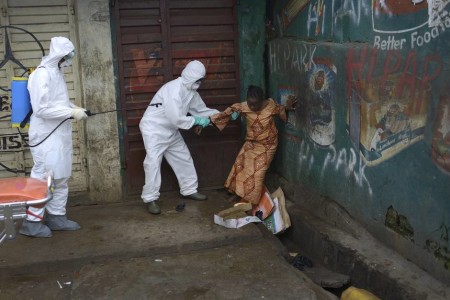Sierra Leone’s three-day lock down has come to a close. People were told to stay at home across the country while volunteers went door to door educating people on Ebola prevention and encouraging sick people to seek treatment.

Many officials are referring to this massive shutdown as the “Zero Ebola Campaign.” The goal is to stop the spread of the disease, explained Roeland Monasch, from UNICEF, one of the partners in the campaign.
It was also involved in a previous shutdown last September when people were also told to stay at home and volunteers moved around raising awareness.
“We do not like to call it the lockdown because it has a negative connotation, like we are going around, like the military, door to door to pull people out. But that is not the case, these are social mobilizers who are engaging in a positive, constructive way with community members,” he said.
Mary Kargbo was one of those people. She is a nurse and was one of the 25,000 volunteers doing the door to door awareness. She hopes this will make a difference in the long run.
“Some people up to now are still doing things they should not do, some are still washing [dead, infected] bodies and keeping the sick in the house,” she said.
The virus is spread through direct contact with bodily fluids and people washing dead bodies has been a big problem in increasing transmission. Almost 4,000 people have died in Sierra Leone from Ebola.
Although cases are decreasing, Freetown is still one of the most affected areas. Hannah Konteh was another volunteer involved in the three day campaign.
She said because of the decrease in cases, people became complacent. That is why she is dedicating her time to also spreading the word in her own community of Tengbeh Town, a suburb of Freetown, whenever she has spare time.
“We need to let them know that Ebola is real, Ebola kills, it is bad, there is no cure, we just need to let them know, if you are concerned, about your neighbours, your environment your community,” said Konteh.
Monasch from UNICEF agreed and said all the more reason for a second major shutdown.
“It is now a secondary level of denial, in [the] beginning there was denial Ebola existed, now it is like, ‘Ebola is not around anymore.’ So it is a different type of denial, but has the same implications, because we cannot relax,we need to be alert, and that is why we’re going out there to have that engagement with communities,” he warned.
Many people the volunteers visited had a different reaction from the first shutdown, according to the World Health Organization representative in Freetown, Winnie Romeril. Romeril said in both shutdowns bars of soap were handed out. In September’s case people were scared to take it because they thought the soap was poisoned with the virus. This time, people have been a lot more accepting, which shows a change in attitude she said.
Not everything has been smooth though. Police threw tear gas at a crowd on Saturday in the east part of the capital due to fights over food supplies.
So far more than 10,000 people across West Africa have died from the disease. Officials say they want to have Ebola zero cases by mid-April.








